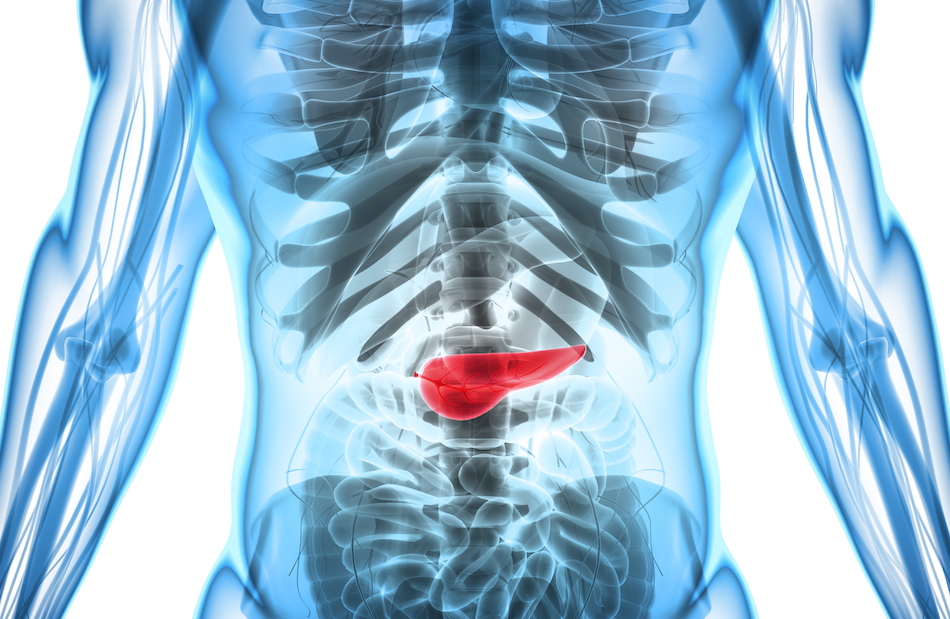Pancreatic cancer is an often aggressive cancer. The pancreas is part of the digestive system and produces the enzymes needed for digestion, as well as hormones such as insulin. There are cancers developed from the pancreatic gland or adenocarcinoma, but also tumours affecting the secretory cells of the pancreas, endocrine tumours. Adenocarcinoma is the most frequent and is manifested by jaundice, pain in the upper abdomen, weight loss, diarrhea.
When a mass is discovered on the pancreas, it may be a benign or malignant tumour. Benign pancreatic tumours are rare and most often do not cause any health problems. There are various malignant tumours, i.e. cancerous tumours, the most common form of which is adenocarcinoma.
Pancreatic cancer generally affects men over the age of 50.
Symptoms:
• Jaundice
• Abdominal pain
• Digestive disorders
• Shortness of breath
• Development of diabetes
• Inflammation of the pancreas
Causes:
• Genetic and hereditary factors
• Tobacco
• Alcohol
• Obesity
• Diabetes
Duration of hospital stay
2 to 4 weeks.
Depending on each patient, the duration varies.
Average length of stay
1 month.
The length of stay varies according to the patients.
Several stays may be necessary.

Every year, nearly 11 million patients go abroad in search of medical care. At MEDICAIM, we provide our patients with access to the best hospitals and doctors around the world. Contact us to learn more about your treatment options.
Ask for your free quote abroad
Start your medical stay by requesting a quote. Our customer service department will help you find the clinic that best suits your needs and get you a quote.
The oncologist will begin the consultation with a clinical interview associated with the following examinations:
• Biological examinations
• Ultrasound and/or scanner
• MRI scan
• Laparoscopy
• Biopsy
The oncologist will establish a treatment plan based on these results.
The surgery is performed under general anesthesia. A conventional abdominal incision or a minimal incision of a few centimetres to introduce miniaturized surgical instruments (laparoscopy) can be made. Laparoscopy, if technically feasible, has the advantage of limiting the scope of the operation.
Two possible surgeries:
• Left splenopancreatectomy: it consists of removing the body or tail from the pancreas in which the tumour is located. In this case, the surgeon must also remove the vessels that pass through this area of the organ and the spleen that is in contact with it.
• Cephalic duodenopancreatectomy or Whipple's operation: this operation is considered when the tumor is located in the head of the pancreas, which is then removed. The surgeon then performs excision of the right part of the pancreas, the bile duct and adjacent portions of the stomach and duodenum. The last step of the operation consists in closing the rest of the stomach and suturing the two parts of the intestine that framed the portion removed from the duodenum. The surgeon also restores the bile circulation pathway between the liver and intestine.
General anesthesia
The procedure can last from 1 to 2 hours.
Surgery is the only potentially curative treatment for cancer, but it is only possible when the disease has been diagnosed at an early stage.

After the operation, the patient remains in intensive care for a few days and then returns to the department in which he or she was admitted. Hospitalization often lasts two to three weeks.
After analyzing the removed tissues by microscope, the medical team chooses and proposes the type of treatment.
Chemotherapy (before surgery and to treat an advanced and inoperable tumour), radiotherapy and/or chemotherapy may be offered.
After the treatment, the specialist determines with the patient his/her follow-up.
Pancreatic cancer can have disabling consequences in patients such as pain, eating disorders, severe fatigue.
Pancreatic cancer is a malignant tumour whose prognosis remains generally poor. The 5-year survival rates range from 5% for non-operable cancers to 30% when the tumour could be operated on at the time of discovery.
Some complex diseases such as cancer can lead some patients to seek a second medical opinion. Almost 50% of patients using the second medical opinion have seen their treatment options evolve. Seeking a second medical opinion is perfectly legitimate when faced with a serious illness.
Click here to find out more about the second MEDICAIM medical opinion
MEDICAIM is looking for the best specialists for you and we will offer you several renowned doctors.
MEDICAIM organizes your entire stay for you: post-operative nursing care, biological follow-up, therapeutic, nutritional and psychological support.
Any additional questions? Ask your MEDICAIM doctor about it: careteam@medicaim.com
Some needs and conditions are more complex than others. In case of doubt, please send us additional information to establish a customized quote.
Ask for a quoteCertains besoins et pathologies sont plus complexes que d’autres. En cas de doute, faîtes-nous parvenir des informations complémentaires pour établir un devis sur-mesure.
Demander un devisEntrust us with your medical file and it will be examined by a specialist doctor. The goal?
Allow you to evaluate all your treatment options.